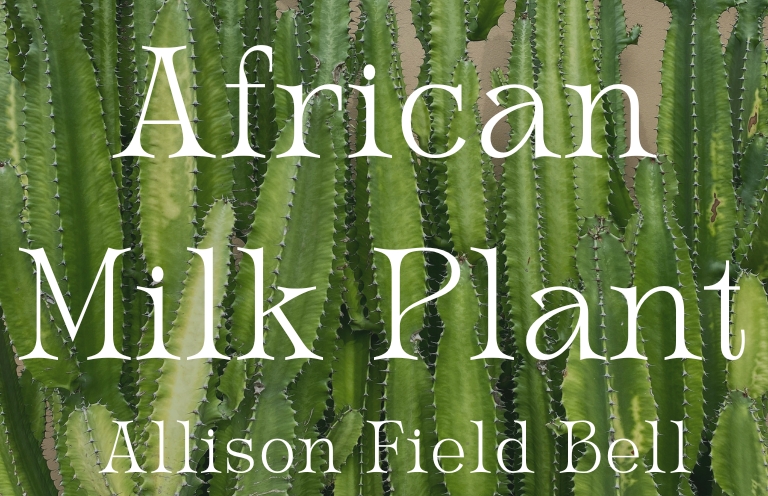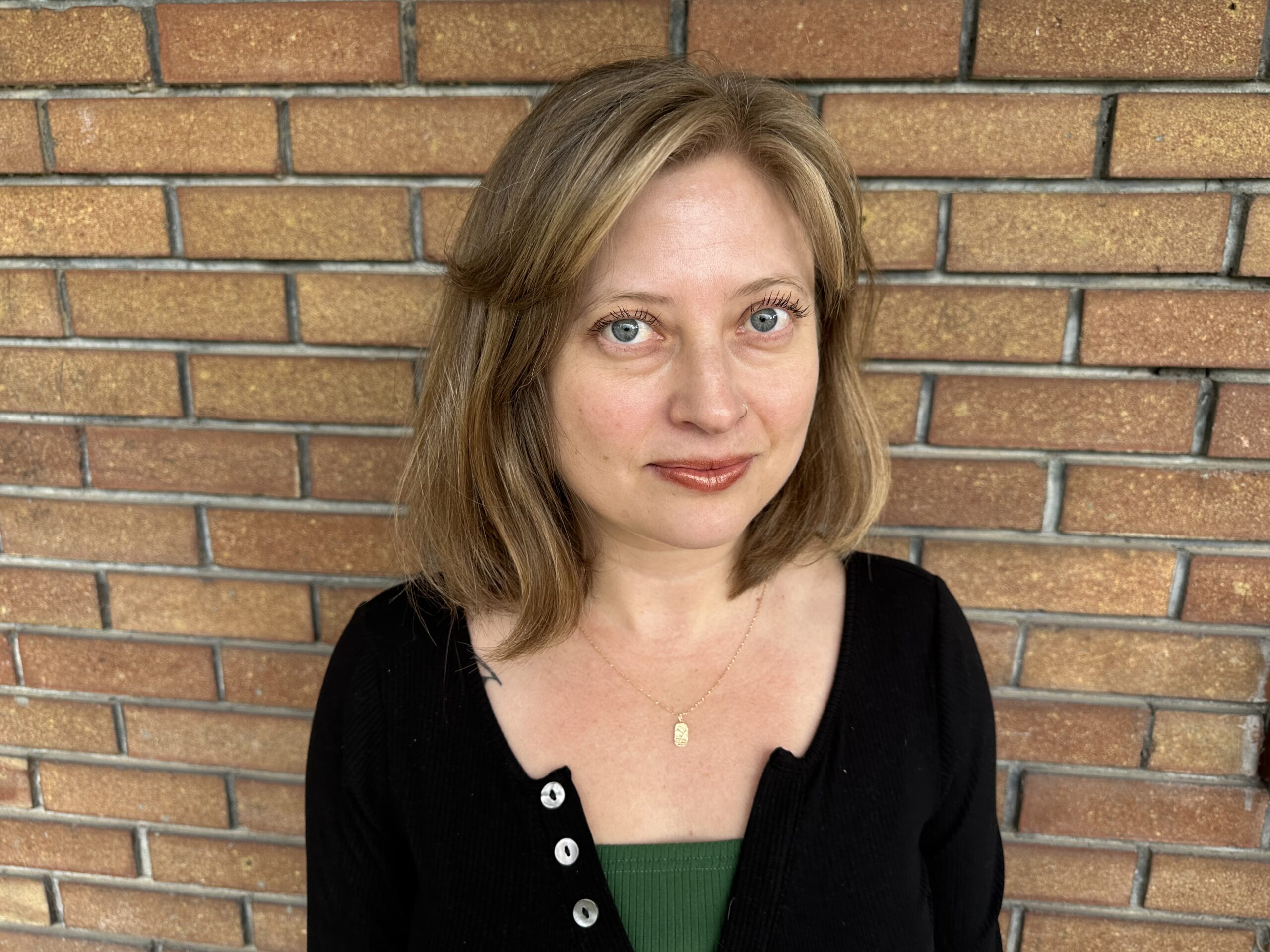Allison Field Bell’s “African Milk Plant” is a beautifully subtle yet complex story that centers around a single interaction between the narrator and a hospitality worker caring for a hotel’s plants. The tension in this story comes from all the two characters don’t say about the lives they’re living beyond this moment.

The bulbs are forced to bloom. That’s what the girl who cares for the plants says to me. Amaryllis and hyacinth. Icicles drip down windowpanes. I say, “It’s winter though,” and the girl stares out at the landscape of white and gray. She shrugs, continues watering a fern.
I recognize the passivity of the shrug. The shrug says whatever I want it to say. She agrees with me or not.
“It’s winter,” I say again. “Hyacinth does not bloom in the winter.”
The girl says, “Guests think it smells nice.”
I say, “It does smell nice.”
She shrugs again.
I say, “In the spring.”
The girl moves to a pothos and clips away its yellowing leaves. Nothing dirty, nothing dead. No seasons.
I imagine a life for her. Twenty, maybe. Can’t drink. Christian maybe. Catholic. Something about New England says Catholic. Can’t drink. Can’t fuck. But she loves plants. This is her first job, and if she’s being honest, she loves it with all her young strong heart. She wants to run a botanical garden someday. Nothing too ambitious, not in New York City or anything. Maybe somewhere in Michigan or Utah. Although, she’d like to visit the Amazon. All that green.
Back in reality, the girl asks, “Do you garden?”
I shift from foot to foot, unsure of what to do with my hands. “A little,” I tell her.
Really, I just walk the streets of my neighborhood identifying plants. Daffodil. Peony. Crocus. I live in an apartment. I have a spider plant. A pothos. I have a monstera.
She says, “My mother has a giant garden.”
I say, “Oh.”
I cross my arms over my chest, squeezing.
The girl continues: “She plants a lot of pumpkins.”
I say, “I love pumpkins.”
The girl does not understand my apology. She moves to water a plant I don’t recognize.
“What’s that?” I ask.
She says, “A kind of euphorbia. African Milk Plant.”
I say, “African?”
She says, “That’s the common name.”
I wonder how African Milk Plant feels in Vermont. How she feels about the cold, the icicles. I imagine the girl wondering too: Maybe it’s not just the Amazon she wants to see. Maybe it’s some savanna too. Or wherever in that vast continent African Milk Plant lives. Or maybe she wants none of that. Maybe she wants a museum in Paris. She’s young and can have all those things.
I say, “Have you been to South America?”
She looks at me like I’m an idiot. Like somehow I think Africa is South America. I recover myself, or try to: “Have you been to the Amazon?”
She studies the waxy green trunk of African Milk Plant. “After college,” she says. “I traveled to Costa Rica.”
“College?”
“Boston University. Communications.”
“Right,” I say.
I imagine a different life for her. An older life wherein she has a college degree. Wherein this is not a thing she loves but a job. I know jobs. I know the shrug now. Boredom. Complacency. A paycheck. I wanted her to be better than me.
Then she says, “Check this out.” Looks around and quickly snaps off a piece of African Milk Plant.
“Oh,” I say, skin tingling as though she has ripped off a part of me.
The wound on African Milk Plant seeps white, like pus, like milk.
“Look,” she says. “The reason for the name.”
I reach out to touch it, to stop the oozing liquid.
“No,” she says, pushing my hand away. “It’s toxic.”
“Sorry,” I say.
She looks at me for maybe the first time, full on in the face. What she sees: a forty-year-old woman alone in a cold place, obsessed with plants because she can’t stand to look at the man who lives in her apartment too. The man who won’t marry her, not because he doesn’t love her per say, but because she doesn’t make enough money. Because she isn’t “economically viable.”
The girl says, “My mother is always telling me not to apologize.” She says, “Women are always apologizing.”
“Yes,” I say. “We are.”
To myself, to the plant, I say, I’m sorry.
Then the girl/woman takes the broken piece of African Milk Plant and places it gently in the dirt beside the other stalks. She uses her fingers to dig out a tiny hole, buries the piece as if there were roots.
“It will keep growing,” she says. “A new part of the plant.”
Outside the window, it begins snowing. And I try to remember how I got here. An airplane, a shuttle. I try to remember why I left. That man. Those houseplants staring at me all day, accusing me of something. They want more light, freedom. A tall bookshelf with too many books. They want a place of their own.
The girl/woman is saying something about having a nice day.
“Sure,” I say. “You too.”
Alone again, I stand for a long time watching the snow. The clouds split and African Milk Plant is abruptly in the sun. Her tiny leaves like petals hold the light. I reach out to touch her, careless of toxicity. The milky liquid is cold. I let it pool on my fingers. Let her weep into my palm, but she is already healing, and I am the only one crying.
 Allison Field Bell’s debut poetry collection, All That Blue, is forthcoming in 2026. She is also the author of two chapbooks, Without Woman or Body and Edge of the Sea. Find her at allisonfieldbell.com.
Allison Field Bell’s debut poetry collection, All That Blue, is forthcoming in 2026. She is also the author of two chapbooks, Without Woman or Body and Edge of the Sea. Find her at allisonfieldbell.com.
